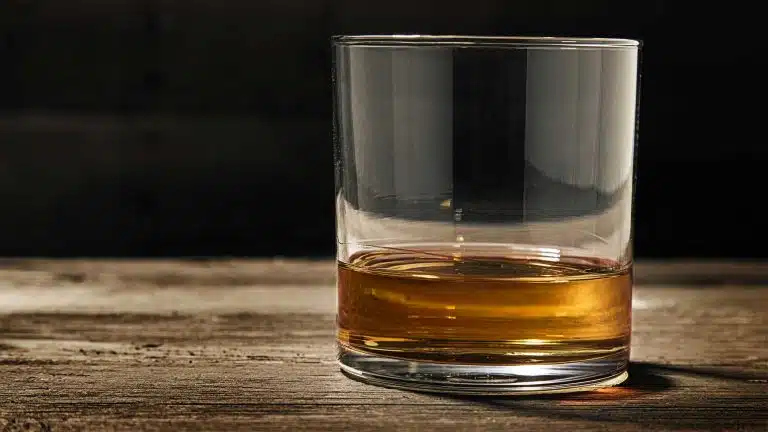Drinking Whiskey Neat | Effects & Concerns

Drinking whiskey neat refers to pouring whiskey into a glass and drinking it without adding anything else. This way of drinking is also called drinking “straight” or “straight up.”
Neat whiskey is consumed at room temperature without any ice and is sometimes seen as the “purest” way to drink it.
Straight Whiskey Basics
Whiskey is a distilled spirit made from fermented grains and stored in wooden casks. In the U.S., the whiskey must be at least 40% alcohol by volume (ABV) to legally be whiskey. This is a high alcohol content comparable to strong spirits like vodka or tequila.
Slight variations on neat whiskey include drinking whiskey on the rocks (with ice cubes) or diluting the whiskey with a splash of water. Drinking whiskey neat is popular, but it can be harmful to your health as any other form of alcohol.
Effects Of Drinking Whiskey Neat
Since whiskey can be made from any fermented grain, there are many types of whiskey all over the world. Some are classified on where they are made, while others are separated on the type of grain used to make them.
Whiskey can also be sorted by what kind of distillery produces it. Single malt scotch is a type of whiskey that was distilled and aged in a single distillery and is usually considered high-quality.
Other types of whiskey include:
- scotch: made in Scotland, also known as “Scotch whisky”
- bourbon: first made in Kentucky, a popular American whiskey
- rye whiskey: made from rye or rye mash
- Irish whiskey: made in Ireland, including popular brands like Jameson
The potential risks of drinking whiskey can apply to any of the specific types or brands.
High Alcohol Content Of Whiskey
Whiskey has a high alcohol content of more than 40%, but the alcohol content may change depending on where you get your whiskey from. Due to its high alcohol content, 2 ounces of whiskey is the limit for a standard drink.
Limiting the number of standard drinks you have can help you drink responsibly. If you are not careful in pouring your whiskey into a cocktail glass, your glass of whiskey may be in heavy drinking territory without you knowing.
It can also be easy to mix too much whiskey into popular whiskey cocktails, like a whiskey sour or Old Fashioned. Whiskey has the same side effects and health risks as other types of alcohol. Too much alcohol is linked to short- and long-term effects such as:
- alcohol poisoning
- risky behavior
- vomiting
- high blood pressure
- liver damage
- alcohol use disorders
- some forms of cancer
Taste & Feel
Whiskey has a variety of names and tastes depending on where it is made, but all types of whiskey have high alcohol content. Drinking whiskey neat can be unpleasant, especially if you are trying it for the first time.
Alcohol can cause a burning sensation in your mouth and throat, especially if you are not mixing it with anything else. This burning can be harmful to your mouth and throat over time, causing effects like dry mouth, changes in bacteria living in your mouth, and even some forms of cancer.
Many types of whiskey also have complex flavor profiles. Some whiskey connoisseurs say whiskey flavors are so complex, you need to train your taste buds to recognize them. The unique taste and burning that comes with drinking whiskey neat can be off-putting to some people.
Allergic Reactions
Being allergic to alcohol is rare, but true alcohol allergies are a serious health matter. It is more likely to be allergies associated with the ingredients used to make whiskey, which include:
- barley
- corn
- rye
- yeast
Allergic reactions to these ingredients include trouble breathing, indigestion, hives, and anaphylaxis (in serious cases).
Drinking Too Much Whiskey
Whiskey has been a popular alcoholic beverage for centuries and is often drank neat, with a few drops of water, or in a number of classic cocktails. Fans of whiskey may debate what the best whiskey is, but when it comes to your health, whiskey is more likely to hurt you than help you.
A couple of ounces of whiskey may not be bad for your health at first, but drinking too much over any period of time can hurt you in a number of ways. If you feel like you cannot stop drinking whiskey, it may have already affected your physical and mental health.
If your drinking habits are starting to hurt your lifestyle, help is out there. To find an alcohol abuse treatment program that works for you, please contact our helpline today.
Written by Ark Behavioral Health Editorial Team
©2024 Ark National Holdings, LLC. | All Rights Reserved.
This page does not provide medical advice.
Electronic Code of Federal Regulations - Electronic Code of Federal Regulations (eCFR)
National Library of Medicine: PubMed Central - Alcohol-related diseases of the mouth and throat - PubMed
Questions About Treatment?
Ark Behavioral Health offers 100% confidential substance abuse assessment and treatment placement tailored to your individual needs. Achieve long-term recovery.
100% confidential. We respect your privacy.
Prefer Texting?
Our friendly support team is here to chat 24/7. Opt out any time.







 Learn More
Learn More








